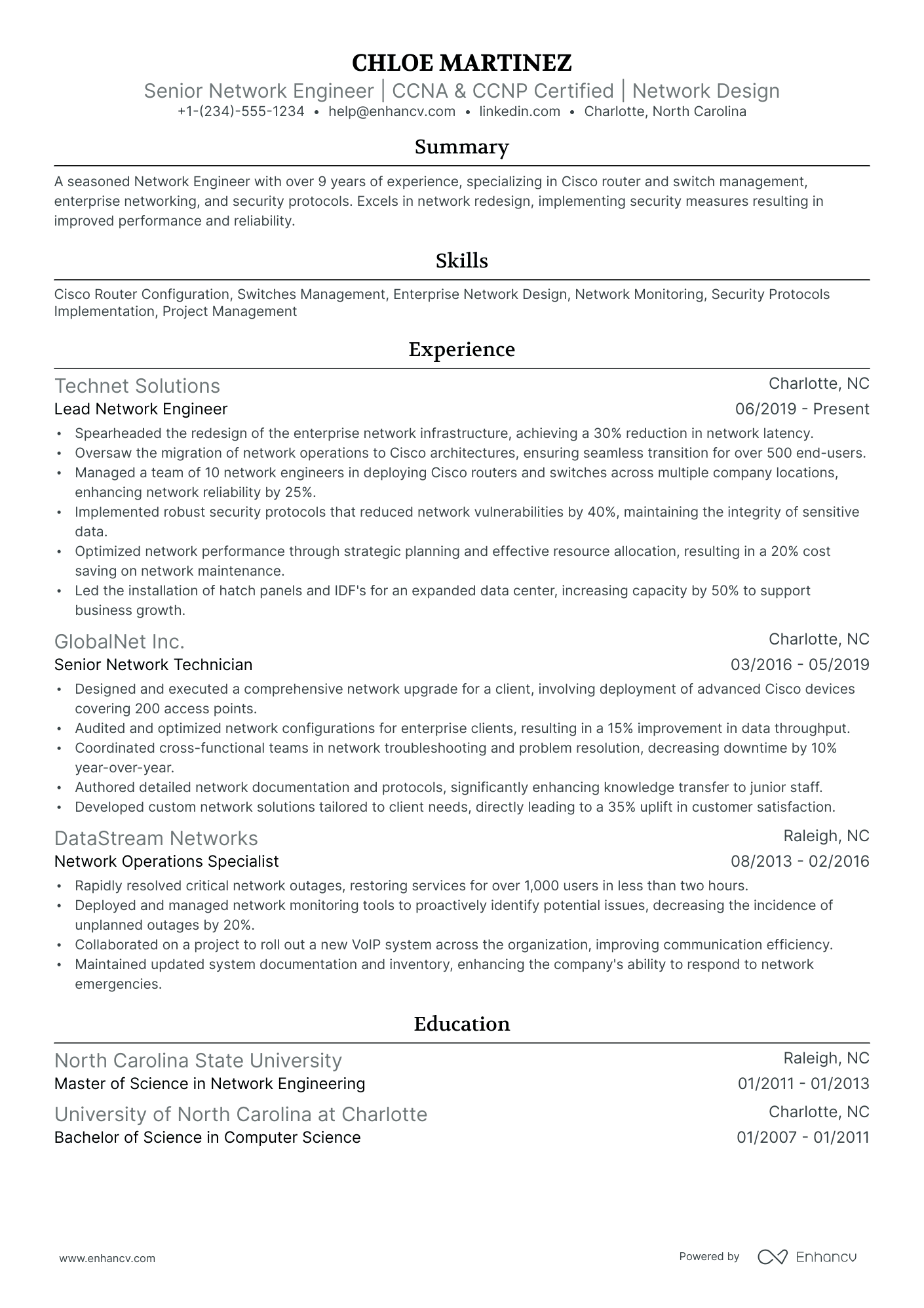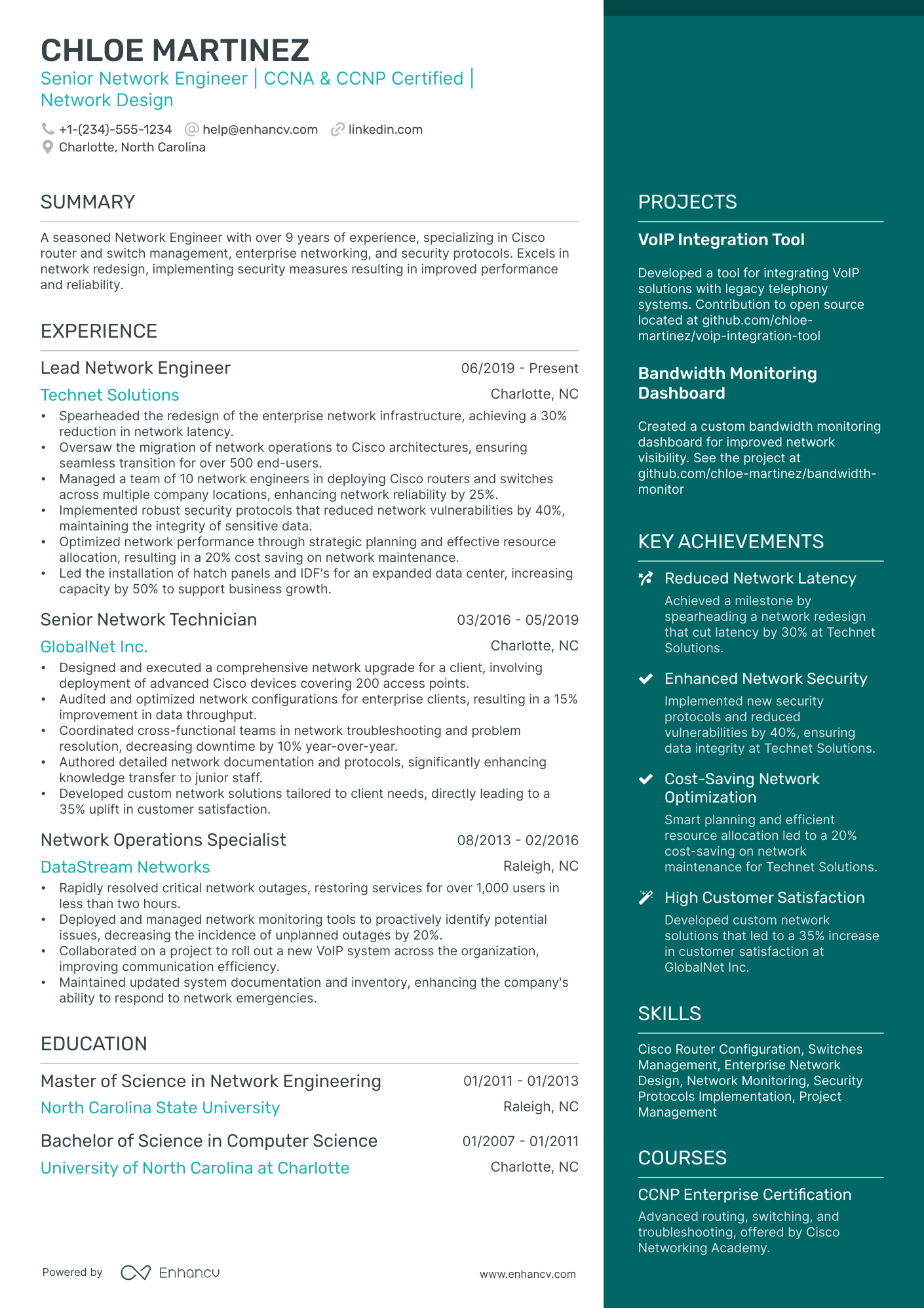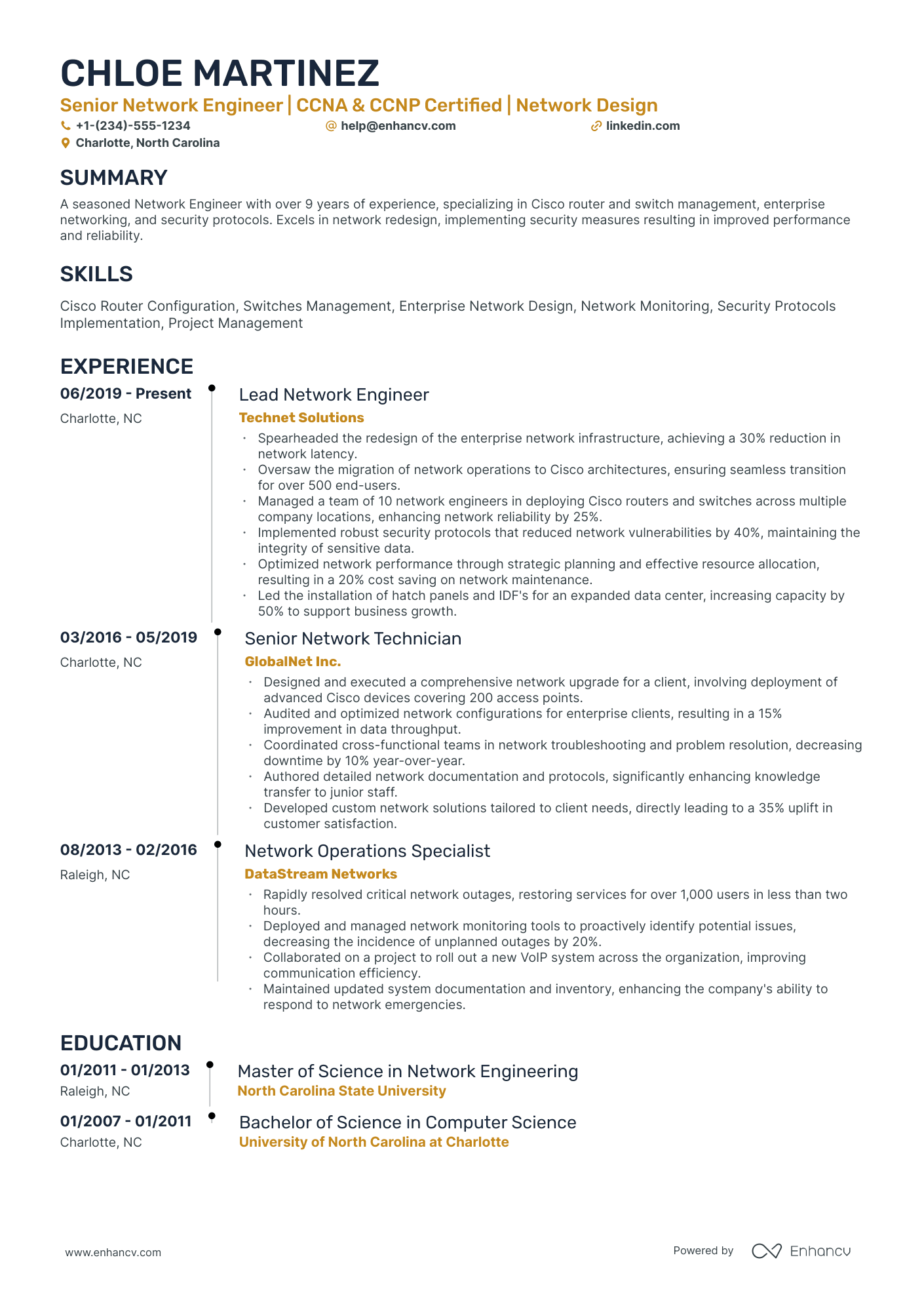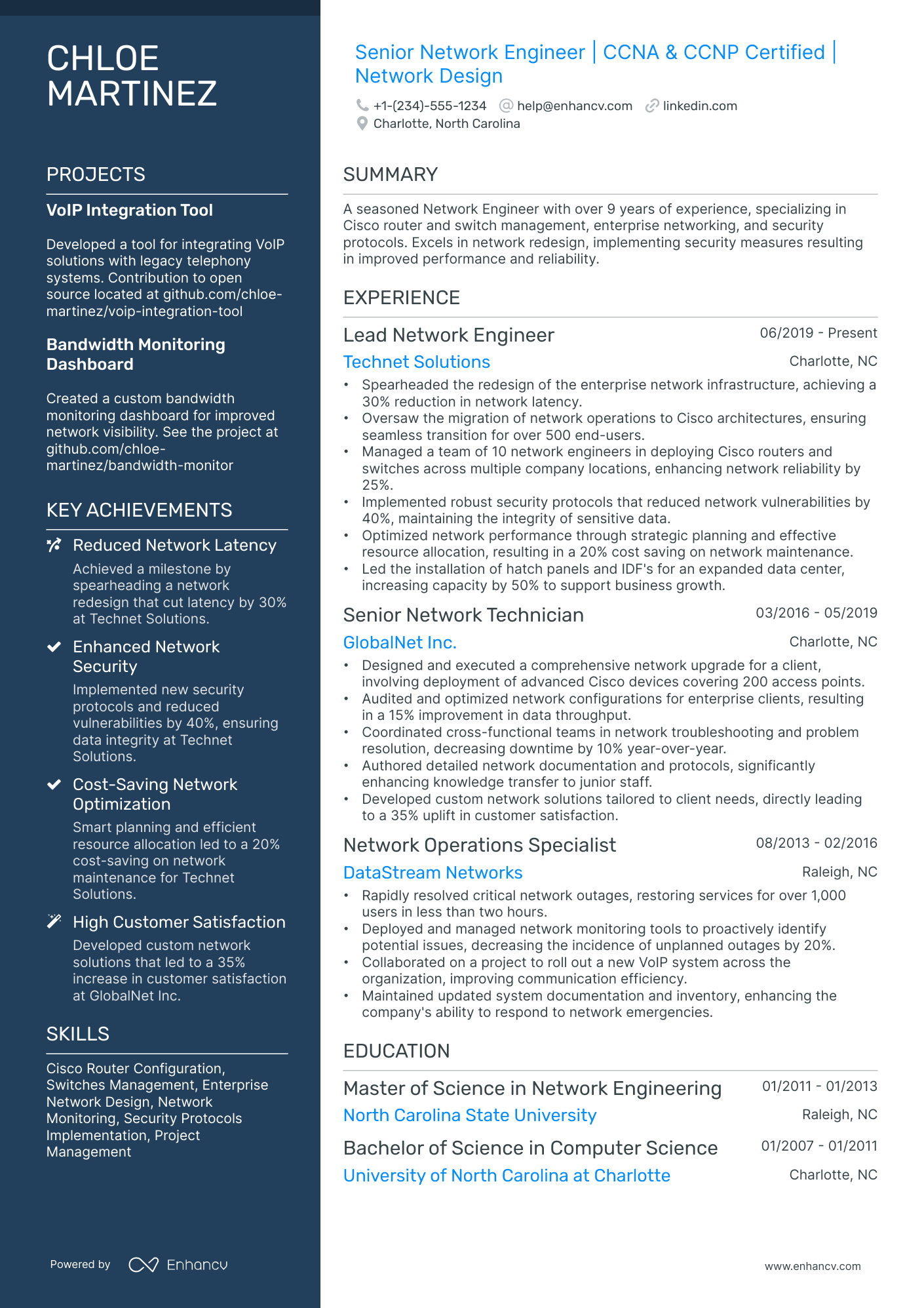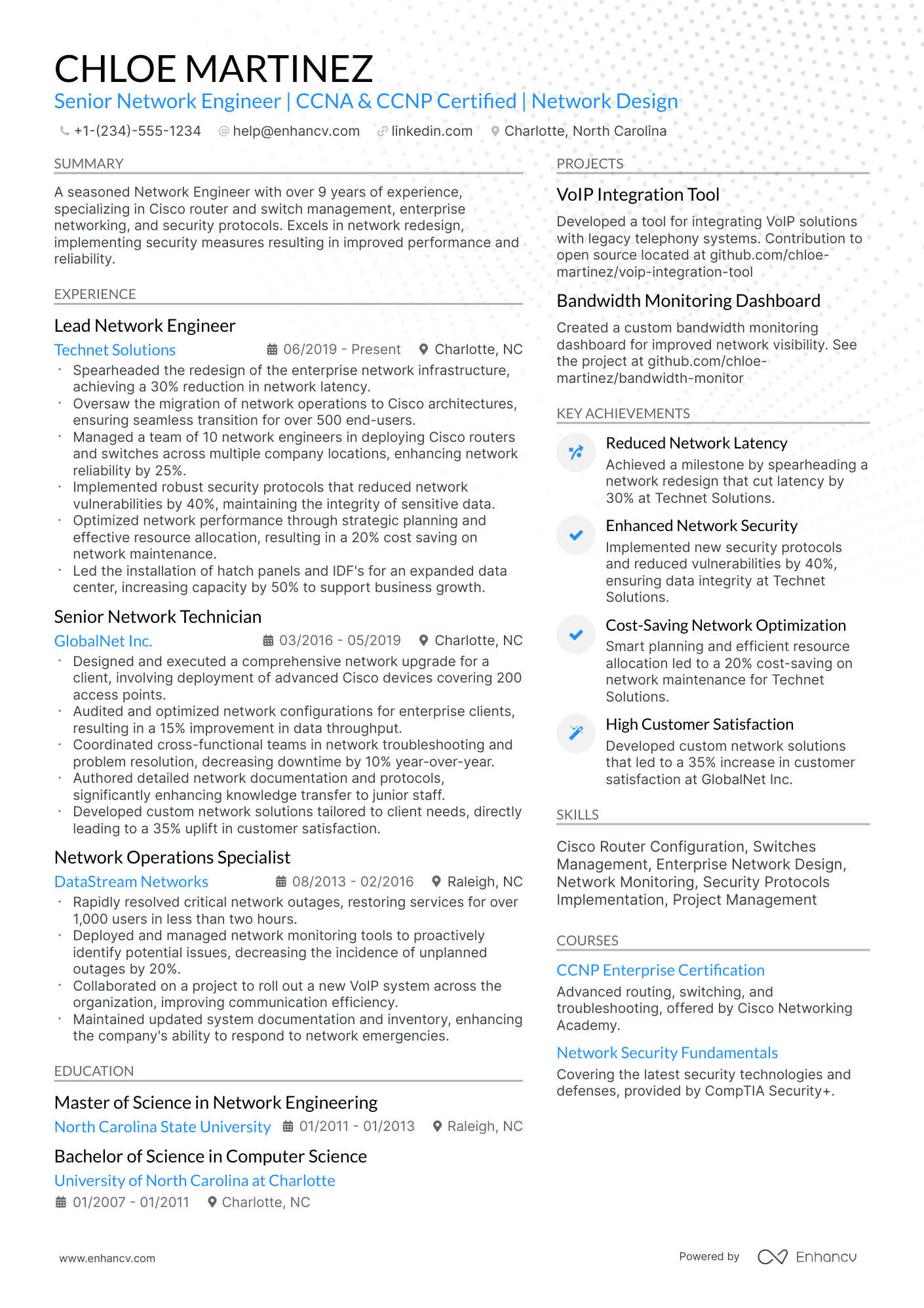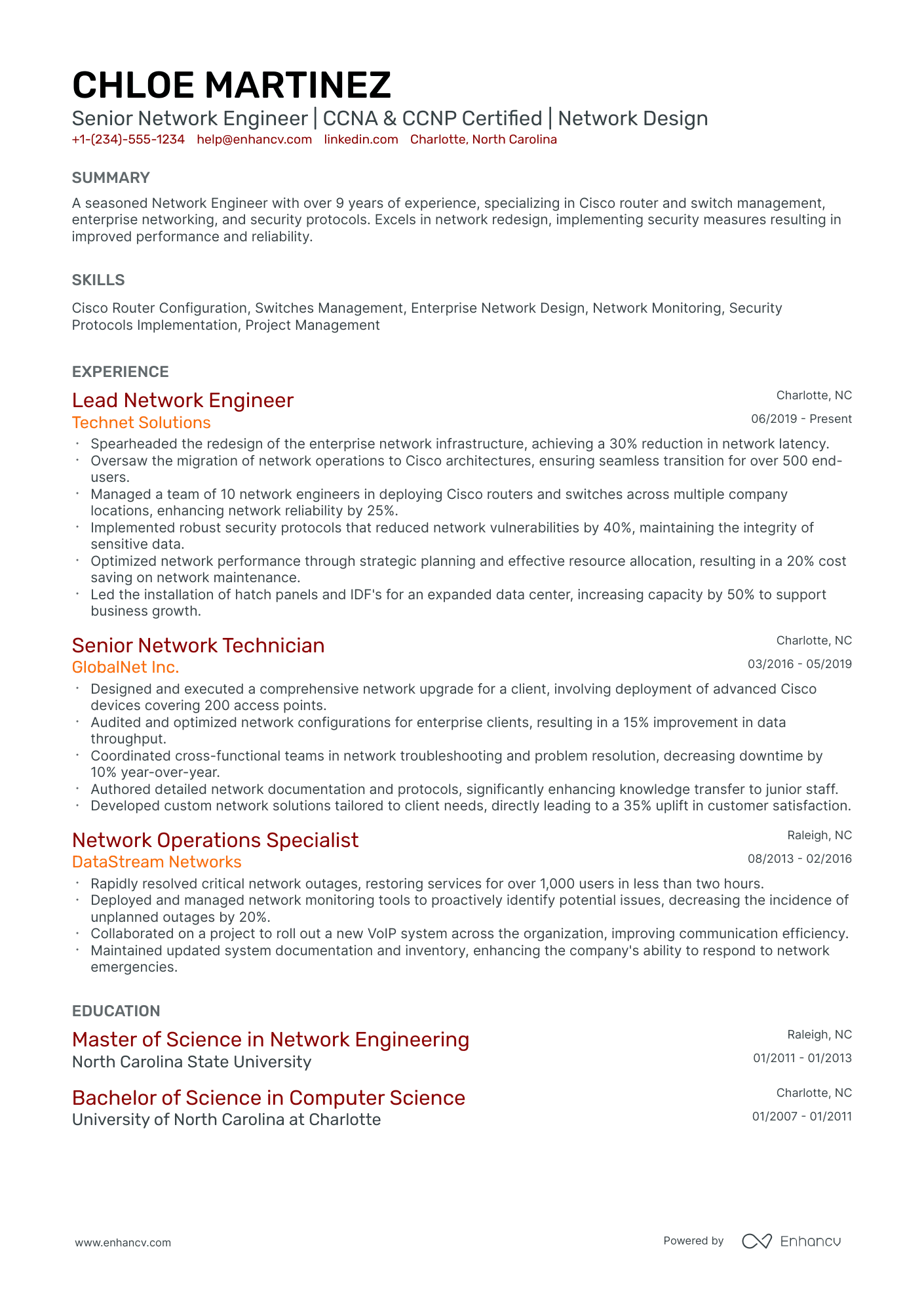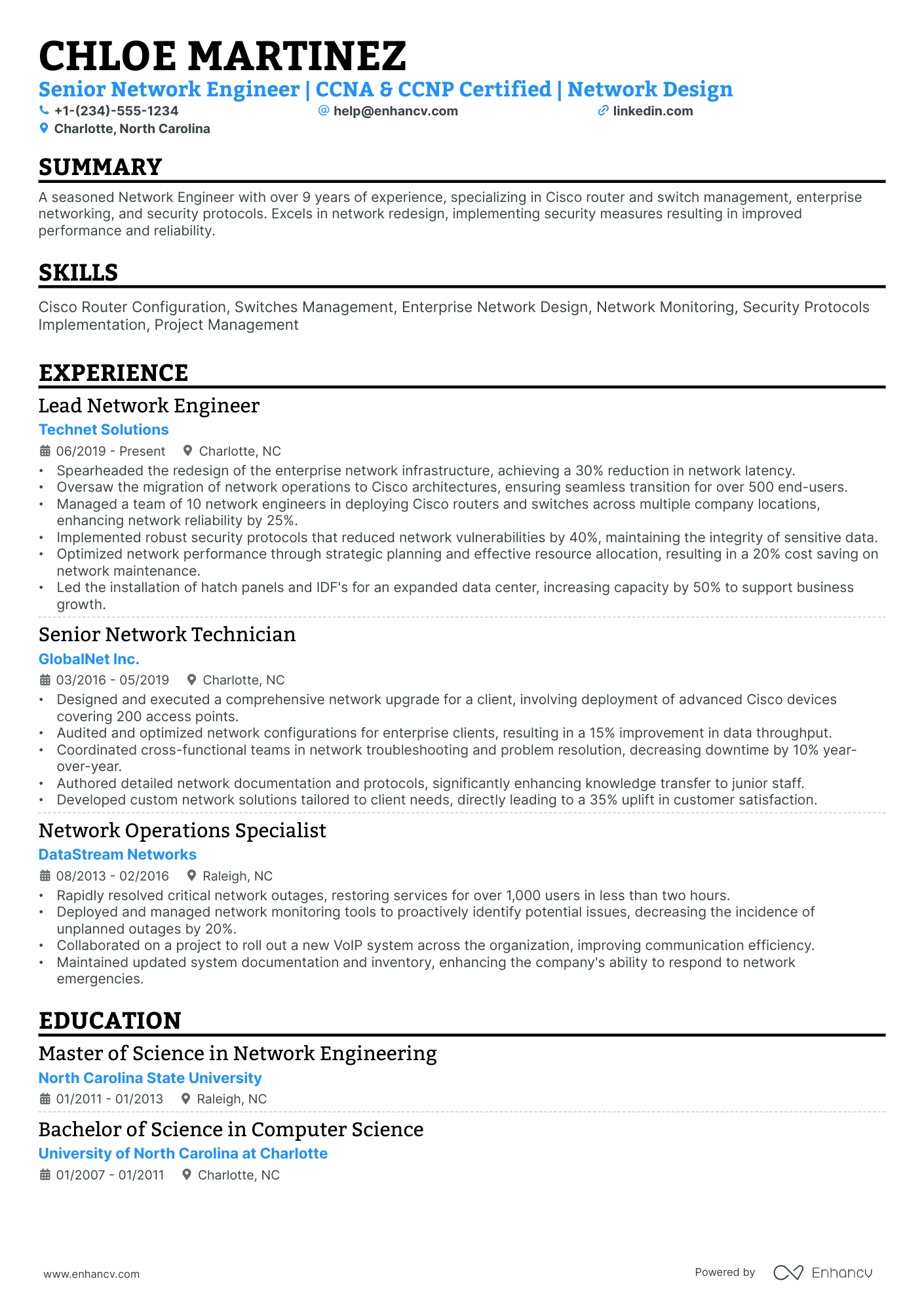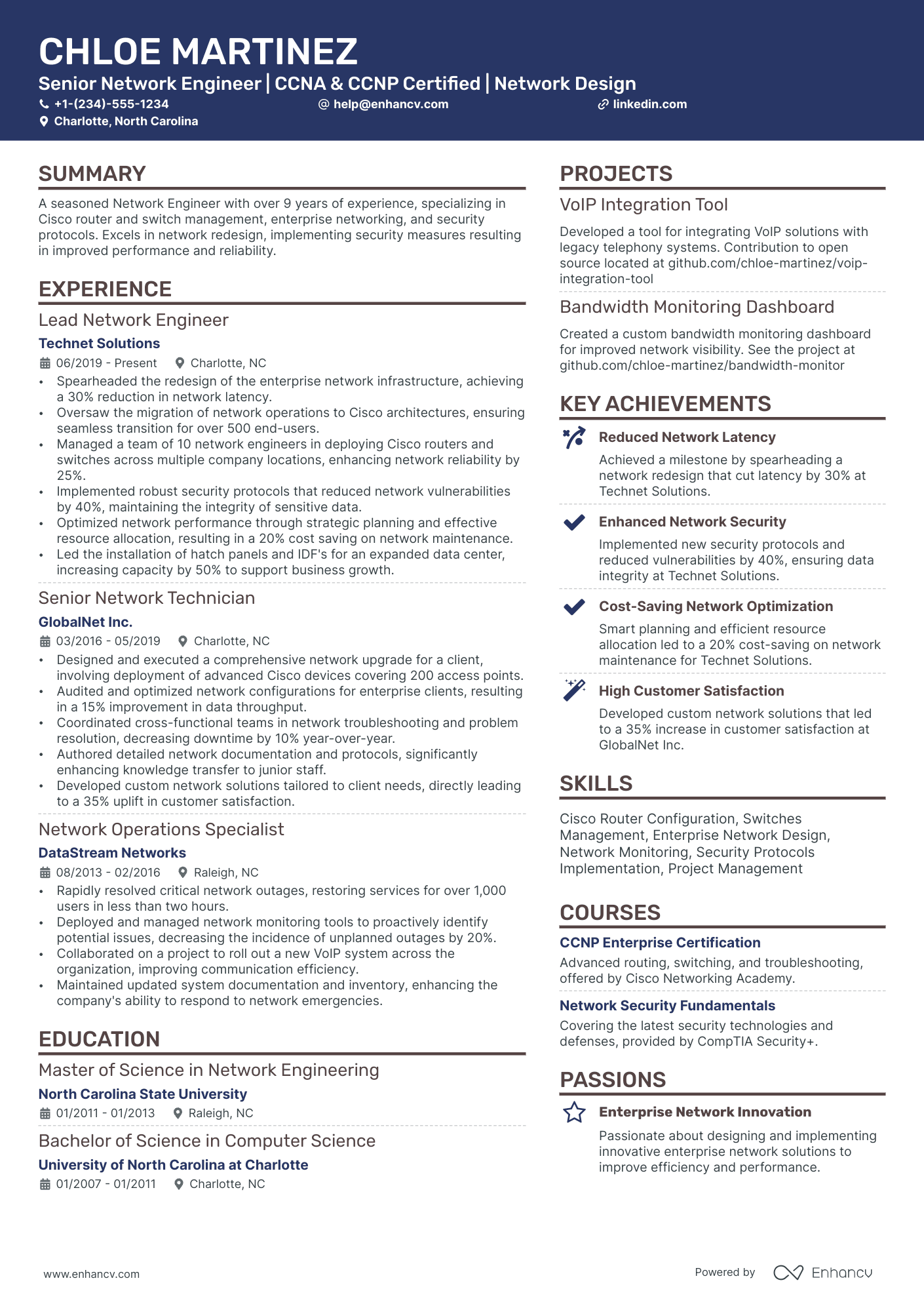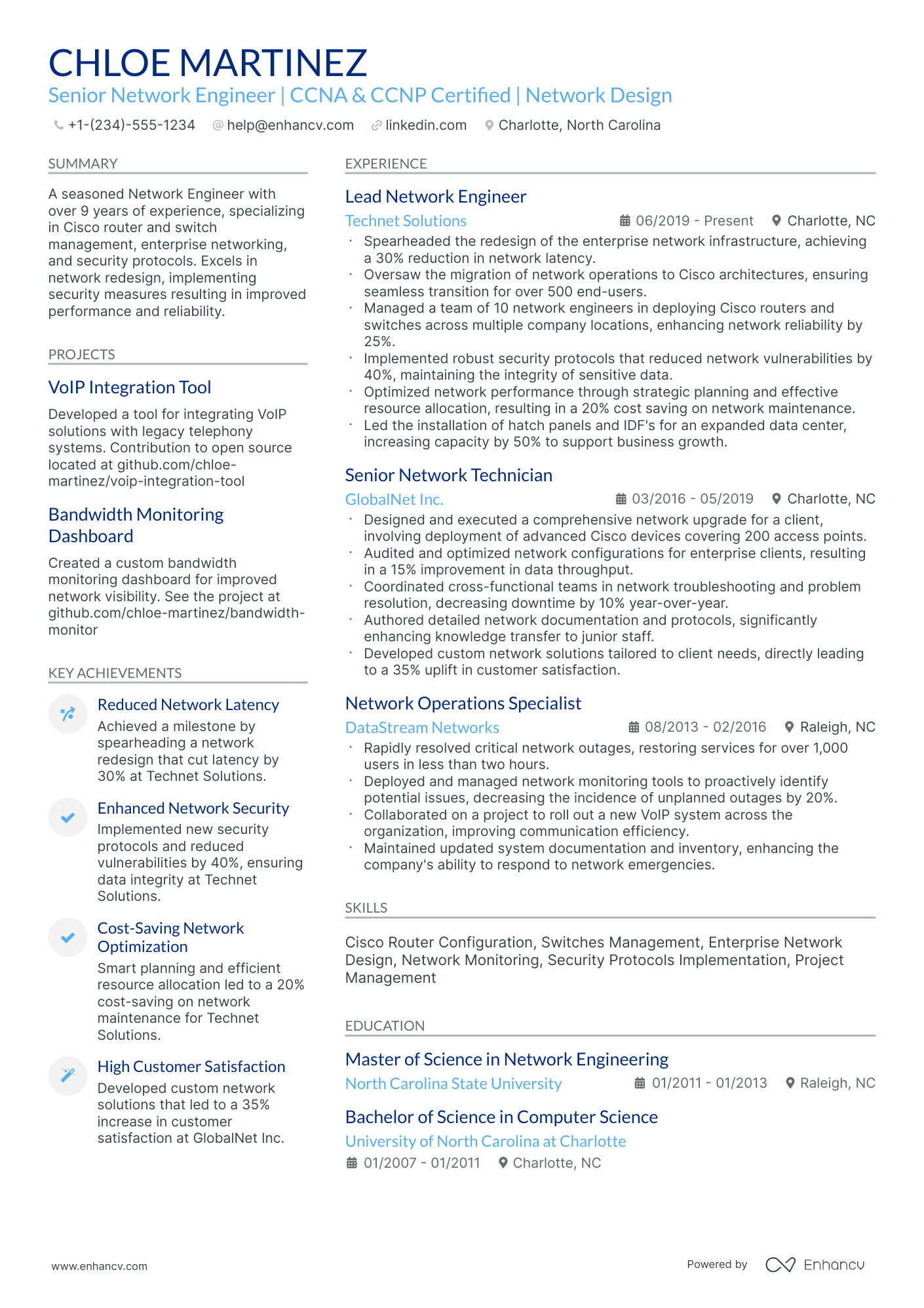As a Ccna network engineer, you might struggle with presenting your complex technical skills in a way that's both comprehensive and understandable to non-technical hiring managers. Our guide is tailored to help you translate your expertise into clear, impactful language that highlights your value, ensuring your resume stands out in a competitive job market.
- Incorporate Ccna network engineer job advert keywords into key sections of your resume, such as the summary, header, and experience sections;
- Quantify your experience using achievements, certificates, and more in various Ccna network engineer resume sections;
- Apply practical insights from real-life Ccna network engineer resume examples to enhance your own profile;
- Choose the most effective Ccna network engineer resume format to succeed in any evaluation process.
- Developer Resume Example
- Technical Support Manager Resume Example
- IT Service Manager Resume Example
- IT Support Analyst Resume Example
- Assistant IT Manager Resume Example
- .Net Full Stack Developer Resume Example
- Statistical Programmer Resume Example
- Hardware Engineer Resume Example
- IT Delivery Manager Resume Example
- Application Engineer Resume Example
Is there a correct way to format your Ccna network engineer resume?
This is a tricky question. While skimming over your resume, recruiters will be looking at your experience and the message your profile conveys. That's why your resume format needs to be clear and concise, serving to supplement and organize your experience. Professional best practices point that the best Ccna network engineer resumes:
- Follow the reverse chronological order, where the most recent experience items are presented first . This is to keep your expertise succinct and to show recruiters your career growth over the years;
- Have a clearly defined header that includes all relevant contact information and a portfolio or a LinkedIn link. In some countries, it is acceptable to include a professional photo , so that your application is more memorable;
- Feature the most important Ccna network engineer resume sections towards the top, e.g. summary, skills, and experience. That way, recruiters can immediately find information that is relevant to the role;
- Take up no more than two pages - and two pages are the exception for more experienced professionals. Keep your expertise to the point and use your Ccna network engineer resume real estate wisely .
- Selecting modern, yet simple fonts, e.g. Rubik, Lato, etc., would help your application stand out;
- Many candidates stick with the tried-and-tested Arial or Times New Roman, but you'd want your Ccna network engineer resume to be a bit more unique;
- The ATS can read all serif and sans-serif fonts, so you should avoid fancy, formal script (or cursive) fonts.
Think about the market’s preferences – a Canadian resume, for instance, could have a different layout.
Upload & Check Your Resume
Drop your resume here or choose a file. PDF & DOCX only. Max 2MB file size.
PRO TIP
If you happen to have some basic certificates, don't invest too much of your Ccna network engineer resume real estate in them. Instead, list them within the skills section or as part of your relevant experience. This way you'd ensure you meet all job requirements while dedicating your certificates to only the most in-demand certification across the industry.
Fundamental sections for your Ccna network engineer resume:
- The header with your name (if your degree or certification is impressive, you can add the title as a follow up to your name), contact details, portfolio link, and headline
- The summary or objective aligning your career and resume achievements with the role
- The experience section to curate neatly organized bullets with your tangible at-work-success
- Skills listed through various sections of your resume and within an exclusive sidebar
- The education and certifications for more credibility and industry-wide expertise
What recruiters want to see on your resume:
- Proficiency with routing and switching technologies, and a solid understanding of network protocols such as TCP/IP, OSPF, EIGRP, and BGP.
- Certifications relevant to the role, particularly Cisco's CCNA or CCNP, which demonstrate a foundational knowledge of networking.
- Hands-on experience with Cisco hardware and software, including routers, switches, firewalls, and network management tools.
- Demonstrated ability to troubleshoot and resolve complex network issues, minimizing downtime and maintaining business continuity.
- Knowledge of network security principles and experience with security devices and firewall configuration.
What is the resume experience section and how to write one for your past roles
The experience section in a Ccna network engineer resume is critical for your profile and overall application. It should not only display your work history, but also highlight your achievements in previous roles.
Many candidates either simply list their duties or provide excessive details about past, irrelevant jobs. A more effective approach involves first examining the job advertisement for keywords - specifically, skills essential for the role. Then, demonstrate these key requirements throughout different parts of your resume, using accomplishments from your roles.
Format each bullet point in your experience section by starting with a strong action verb. Follow this with a description of your role and its impact on the team or organization.
Aim to include three to five bullet points for each role.
Finally, gain insights into how professionals have crafted their Ccna network engineer resume experience sections by exploring some best practice examples.
- Led the design and implementation of a company-wide migration to a new IP scheme, enhancing network efficiency and reducing broadcast traffic by 30%.
- Collaborated on the deployment of a secure VPN solution for remote workers, increasing productivity and enabling seamless remote work capabilities for over 500 employees.
- Managed the routine configuration and troubleshooting of 150+ Cisco devices including routers, switches, and firewalls, ensuring 99.99% network uptime and reliability.
- Implemented a new WAN optimization project that resulted in a 40% decrease in data transfer times between national offices and the data center.
- Coordinated with cross-functional teams to execute a network security audit, identifying and remediating 200+ potential vulnerabilities.
- Spearheaded the successful installation and configuration of a new wireless network infrastructure servicing 1000+ concurrent users with zero downtime.
- Restructured the company's entire network topology to implement VLANs and improve security, achieving a 25% performance increase in inter-departmental communications.
- Played a key role in the post-acquisition network integration of two companies, successfully merging disparate technology stacks and network resources.
- Developed and conducted network performance analyses weekly, resulting in strategic upgrades that increased overall network stability by 20%.
- Crafted and executed a custom monitoring solution using SNMP and Netflow to report on network traffic patterns, leading to a targeted enhancement of network policies.
- Collaborated in the deployment of an enterprise-class firewall that improved network perimeter security and sustained the integrity of confidential data.
- Oversaw the successful migration of on-premises email services to a cloud-based solution, enhancing collaboration for 300+ employees and facilitating a 50% reduction in local server costs.
- Key contributor to a data center expansion project, installing new routing and switching equipment to support a 100% increase in server capacity.
- Provided tier-3 support for network-related issues, reducing the mean time to resolve incidents by 35% through more efficient problem-solving processes.
- Initiated and led a training program for junior network technicians, increasing departmental technical proficiency and reducing errors by 15%.
- Co-developed a network redundancy strategy that maintained critical services during multiple high-risk maintenance windows, ensuring 100% SLA compliance.
- Managed a project to replace outdated network hardware across the organization, which increased the network's speed and reliability by overcoming legacy limitations.
- Optimized network resource allocation which lead to a more efficient QoS policy, prioritizing critical business application traffic and boosting overall user satisfaction.
- Pioneered the use of automated network configuration management tools, decreasing deployment time for new devices by 50% and eliminating manual configuration errors.
- Orchestrated an overhaul of network security protocols by implementing next-generation firewalls and intrusion prevention systems, decisively mitigating the risk of cyber threats.
- Facilitated critical application performance by fine-tuning WAN optimization appliances, resulting in a 60% improvement in latency for remote database access.
- Conducted comprehensive network analysis which led to the revamping of the network architecture to support VoIP and video conferencing technologies, enhancing communication efficiency.
- Directed the upgrade of network infrastructure to support 10Gbps Ethernet, preparing the company for a surge in data demands and future scalability requirements.
- Reduced total cost of network operations by 20% through strategic vendor negotiations and the adoption of energy-efficient networking equipment.
Quantifying impact on your resume
- Highlight the number of network devices you have successfully configured and deployed, showcasing your hands-on technical experience.
- Include the number of network sites you've managed or supported, reflecting the scale and scope of your networking capabilities.
- Mention the percentage reduction in downtime or outages you achieved through proactive network management, demonstrating your impact on reliability.
- Quantify the scale of the networks you've worked on by noting the number of users supported, which underlines your ability to manage large user bases.
- List the number of network security incidents you've resolved, emphasizing your skills in maintaining secure network environments.
- Present the amount of cost savings achieved through network optimizations or vendor negotiations, showing your contribution to financial efficiency.
- Detail the number of projects you've led or participated in, indicating your experience in teamwork and project management.
- Specify the number of training sessions you've conducted or certifications you've earned, illustrating your commitment to professional development.
Action verbs for your Ccna network engineer resume
Lacking relevant Ccna network engineer resume experience?
Learn how to write your Ccna network engineer resume experience in spite of having no real-world (or applicable) experience for the job.
You should:
- Feature relevant projects or publications that could impress recruiters or showcase that you have the basic skill set for the job
- Shift the focus towards your people (communication, organization, etc.) skills to demonstrate that you're a quick learner and can easily adapt to a new environment
- Use the resume objective to not only highlight your accomplishments but also map out how your career plans are perfectly aligned with the company's vision
- Select either the functional-skill-based resume format (that puts the focus on your skills) or the hybrid one (balancing expertise with skills).
Recommended reads:
PRO TIP
If you're in the process of obtaining your certificate or degree, list the expected date you're supposed to graduate or be certified.
Featuring your hard skills and soft skills on your Ccna network engineer resume
The skills section of your Ccna network engineer resume needs to your various capabilities that align with the job requirements. List hard skills (or technical skills) to showcase to potential employers that you're perfectly apt at dealing with technological innovations and niche software. Meanwhile, your soft skills need to detail how you'd thrive within your new, potential environment with personal skills (e.g. resilience, negotiation, organization, etc.) Your Ccna network engineer resume skills section needs to include both types of skills to promote how you're both technical and cultural fit. Here's how to create your bespoke Ccna network engineer skills section to help you stand out:
- Focus on skill requirements that are listed toward the top of the job advert.
- Include niche skills that you've worked hard to obtain.
- Select specific soft skills that match the company (or the department) culture.
- Cover some of the basic job requirements by including important skills for the Ccna network engineer role - ones you haven't been able to list through the rest of your resume.
Get inspired with our Ccna network engineer sample skill list to list some of the most prominent hard and soft skills across the field.
Top skills for your Ccna network engineer resume:
Cisco IOS
Routing Protocols (RIP, OSPF, EIGRP)
Switching Technologies (VLANs, STP)
Network Security (ACLs, VPNs)
IP Addressing and Subnetting
Wireless Networking
Network Troubleshooting Tools (Wireshark, Ping, Traceroute)
Basic Scripting (Python, Bash)
Firewall Configuration
Load Balancing
Problem Solving
Communication
Team Collaboration
Time Management
Adaptability
Attention to Detail
Critical Thinking
Customer Service Orientation
Project Management
Analytical Skills
PRO TIP
Showcase any ongoing or recent educational efforts to stay updated in your field.
What are the best certificates to add to your Ccna network engineer resume + how to curate your education section
The education and certification resume sections are the underdogs of your Ccna network engineer resume.
They showcase to recruiters that you've invested plenty of time to gain valuable and specific know-how, vital for growth.
As far as the resume education section is concerned:
- Detail only advanced education, specifying the institution and timeframe.
- Indicate your forthcoming graduation date if you're in the midst of your studies.
- Consider omitting degrees that don't align with the job's requirements.
- Offer a description of your academic journey if it underscores your notable achievements.
When curating your degrees and certificates on your Ccna network engineer resume:
- Select only accreditation that matters to the role
- Niche knowledge that could help you stand out as a candidate (as is within the past few years), should be listed towards the top of your resume
- Include any pertinent data for credibility (e.g. institute name, graduation dates, etc.)
- Irrelevant degrees and certifications shouldn't make it on your resume. Those include your high school diploma and any specializations that have nothing to do with the technical or soft skills that are required for the job
As a final note, if you feel tempted to exclude your education or certification from your resume, don't.
These two sections could help you have a better competitive edge over other candidates - hinting that your professional journey in the industry may be for a longer period of time.
Recruiters find all of these Ccna network engineer credentials impressive:
The top 5 certifications for your Ccna network engineer resume:
- Cisco Certified Network Associate (CCNA) - Cisco Systems
- Cisco Certified Network Professional (CCNP) - Cisco Systems
- CompTIA Network+ (Network Plus) - Computing Technology Industry Association
- Certified Information Systems Security Professional (CISSP) - (ISC)²
- Juniper Networks Certified Associate Junos (JNCIA-Junos) - Juniper Networks
PRO TIP
If the certificate you've obtained is especially vital for the industry or company, include it as part of your name within the resume headline.
Recommended reads:
Best practices to your Ccna network engineer resume summary or objective
To start, how do you know if you should include a resume summary or a resume objective ?
- Resume summaries are ideal for Ccna network engineer professionals with more experience, who'd like to give a quick glimpse of their biggest career achievements in the top one-third of their resumes.
- On the other hand, resume objectives serve as a road map for recruiters. Candidates use the objective to show how their experience aligns with the Ccna network engineer role they're applying for while showcasing the North Star of their career (or where they want to be as a professional in the next couple of years).
The resume summary or resume objective could be the perfect fit for your Ccna network engineer resume. The function of both is to highlight your professionalism succinctly. So, keep your writing specific: include no more than four sentences and target your application to the role. Here's how these specific resume sections help the Ccna network engineer candidates stand out.
Resume summaries for a Ccna network engineer job
- Seasoned CCNA-certified network engineer with over 5 years of experience specializing in the design, implementation, and maintenance of Cisco-based networks. Adept at complex troubleshooting and network optimization, boasting a track record of reducing downtime by 30% at TechSolutions Inc. Seeking to leverage my expertise in a dynamic environment where my technical proficiency can contribute to efficient network operations.
- Dynamic professional with a 6-year background in software development and a recent CCNA certification. Skilled in Python and network automation, eager to transition into network engineering to drive improvements in network functionality and security. Successfully deployed a company-wide automation tool at SoftTech Innovations which improved system efficiencies by 25%.
- Formerly a cybersecurity analyst with 4 years of industry experience, now a freshly-certified CCNA hopeful seeking to pivot towards network engineering. Familiar with cutting-edge security practices and possesses a deep understanding of network vulnerabilities. Credited with developing a threat-mitigation strategy that was adopted across all departments at SecureNet Corp.
- Accomplished network technician and recent CCNA certificate recipient seeking to advance my career in network engineering. Brings 2 years of hands-on experience in network support and a proven ability to rapidly learn and apply new technologies. At NetTech Services, my proactive approach to network maintenance resulted in a 20% decrease in user-reported issues.
- As a recent computing graduate with a passion for network architectures, I am keen to apply my theoretical knowledge and newfound CCNA certification to a practical setting. Eager to develop hands-on skills in configuring and troubleshooting networks and to contribute to the high standards of network performance and reliability.
- A motivated professional pursuing a career shift to network engineering with a fresh CCNA certification in hand. Bringing an enthusiasm for problem-solving and a commitment to continuous learning and excellence in network infrastructure management. Excited to deploy my analytical skills to maintain and enhance the performance and security of modern network systems.
Optimize your resume summary and objective for ATS
Drop your resume here or choose a file.
PDF & DOCX only. Max 2MB file size.
Beyond your Ccna network engineer resume basics - extra sections
Ensure your Ccna network engineer resume stands out from the crowd by spicing it up with a couple of supplementary sections that showcase your:
- Prizes - as a special nod to what matters most in the field;
- Projects - ones that would really further support your application;
- Hobbies - include only if you think they'd further your chances at landing the role with personality
- Community impact - to hint at the causes you care about.
Key takeaways
- Impactful Ccna network engineer resumes have an easy-to-read format that tells your career narrative with highlights;
- Select a resume summary or objective, depending on what sort of impression you'd like to leave and if your accomplishments are relevant to the job;
- If you don't happen to have much industry expertise, curate additional gigs you've had, like contracts and internships, to answer how your experience aligns with the Ccna network engineer job;
- Be specific about the hard and soft skills you list on your resume to define your niche expertise and outcomes of using those particular skills;
- Always tailor your resume for each Ccna network engineer application to ensure you meet all job requirements.
